Picture this: You're embarking on an enchanting journey through the wellness world, where each step unveils new secrets and natural marvels. In the heart of this mystical realm, you discover a powerful ally—the humble mushroom.
Revered by ancient healers and now a star in the modern health scene, mushrooms are more than culinary delights. They're the key to unlocking enhanced immunity, mental clarity, and overall well-being.
As you delve deeper, a question naturally arises, one that could significantly shape your health journey: "In the intriguing matchup of mushroom extracts vs. powders, which one is the right choice for me?"
Let's simplify this, as easily as sprinkling herbs over a favorite dish. Mushroom extracts are like the concentrated essence of these magical fungi. They're potent elixirs, providing active components in a form that's swiftly absorbed by your body. If targeted health benefits are what you're after, extracts might be your perfect match.
On the other hand, imagine the whole mushroom, dried and finely ground. That's your mushroom powder—the all-rounder in the mushroom kingdom. It's rich in fiber and nutrients, seamlessly blending into your daily diet, and supporting your overall wellness journey.
As you stand at this crossroads, contemplating extracts or powders, remember that your choice hinges on your unique health goals and lifestyle. Are you ready to unravel the secrets of mushrooms and see how they can transform your wellness story? Let's dive in and explore these natural wonders together.
Understanding Mushrooms in Wellness
The Ancient and Modern Magic of Mushrooms
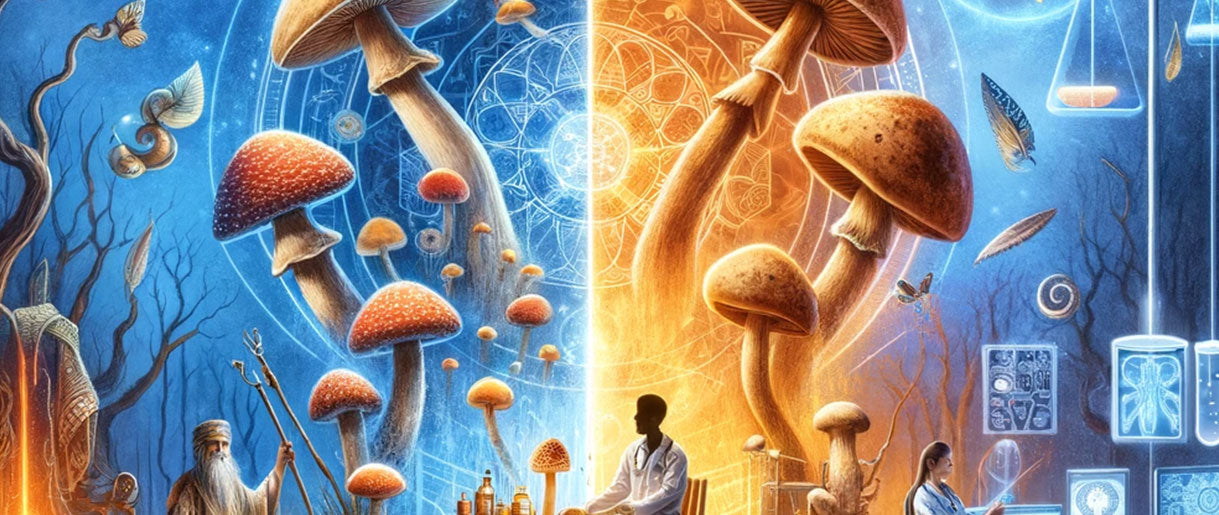
Let's turn back the pages of history. Did you know medicinal mushrooms were not just a part of ancient diets but revered for their almost mystical healing powers?
Fast forward to the present, and here they are again, taking center stage in our modern wellness and self-development stories.
What's Inside These Wondrous Fungi?
It's all about what's inside these earthy treasures. Mushrooms contain beneficial compounds scientists and wellness gurus can't stop raving about.
Each type, from the mighty shiitake to the enchanting reishi, brings its unique blend of health magic. These active compounds in medicinal mushrooms—we're talking about goodies like polysaccharides and triterpenoids—are serious game-changers for health.
Mushroom Supplements: Nature's Little Powerhouses
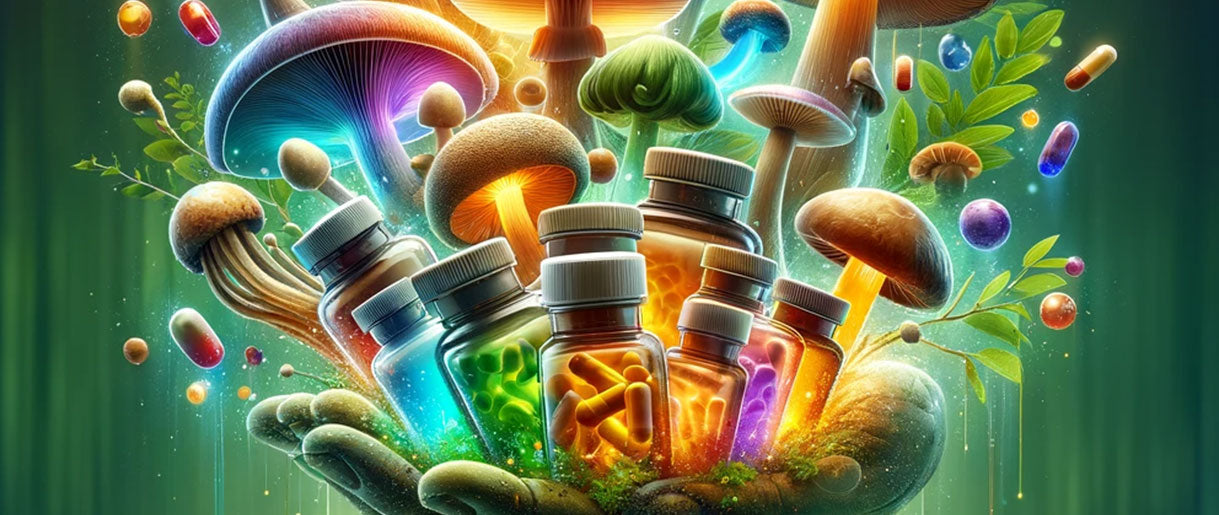
Why are mushroom supplements gaining such a fan following?
Imagine harnessing the full power of a mushroom's fruiting body—the part we see and eat—or even its mycelium, the underground network that's a hot topic in the fruiting body vs. mycelium debate.
This is where the real benefits of medicinal mushrooms shine through.
Functional Mushrooms: Not Just a Wellness Trend
These functional mushrooms are not just riding the wellness wave. They're backed by science, with studies showing how the fruiting body, rich in beneficial compounds, can boost your immune system(1). And it's not just about immunity; these medicinal mushroom products are stepping into the limelight for their role in mental wellness and stress reduction(2).
Meet the Superstars: Reishi and More
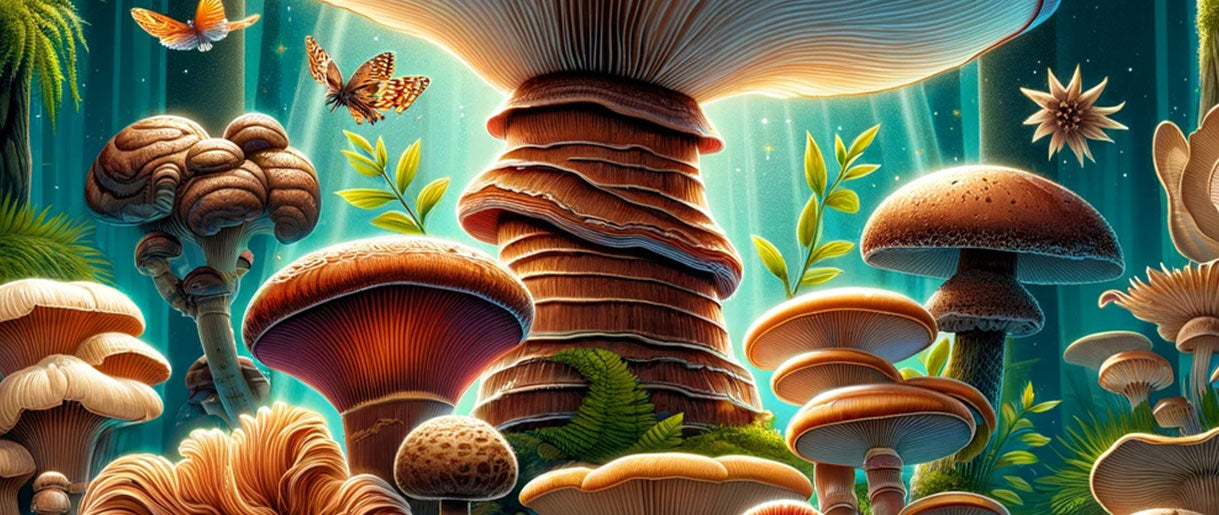
Take the reishi mushrooms, for instance. These aren't just superfood mushrooms; they're packed with bioactive compounds linked to improved immune function (3). And there's more – mushrooms are also a great source of other beneficial compounds, like vitamin D, essential for bone health and immune support.
So, whether it's the physical health perks or the mental clarity you're after, diving into the world of mushrooms could be your ticket to a whole new level of wellness. Who knew these humble fungi could be such game-changers?
Mushroom Extracts - Potent and Powerful
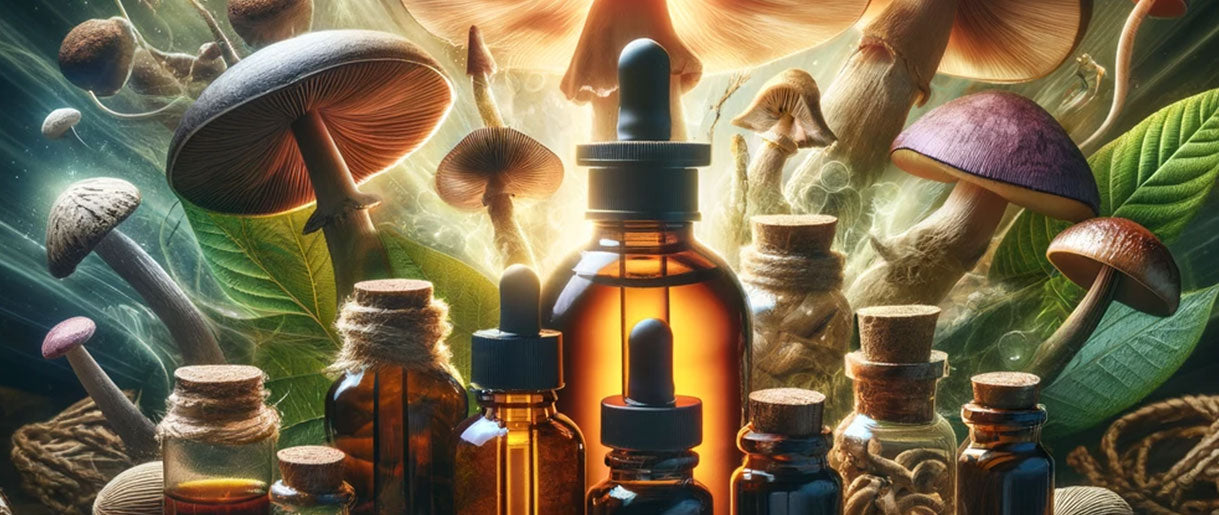
What Exactly Are Mushroom Extracts?
Diving into the essence of mushroom extract, what are we really talking about?
Simply put, a mushroom extract is a concentrated form of medicinal mushrooms, where all the active compounds and beneficial compounds are distilled into a potent form.
It's like capturing the very soul of the mushroom in a form that's easy to consume and packed with health benefits.
Common Methods of Extraction
Hot Water Extraction: The Essence of Simplicity
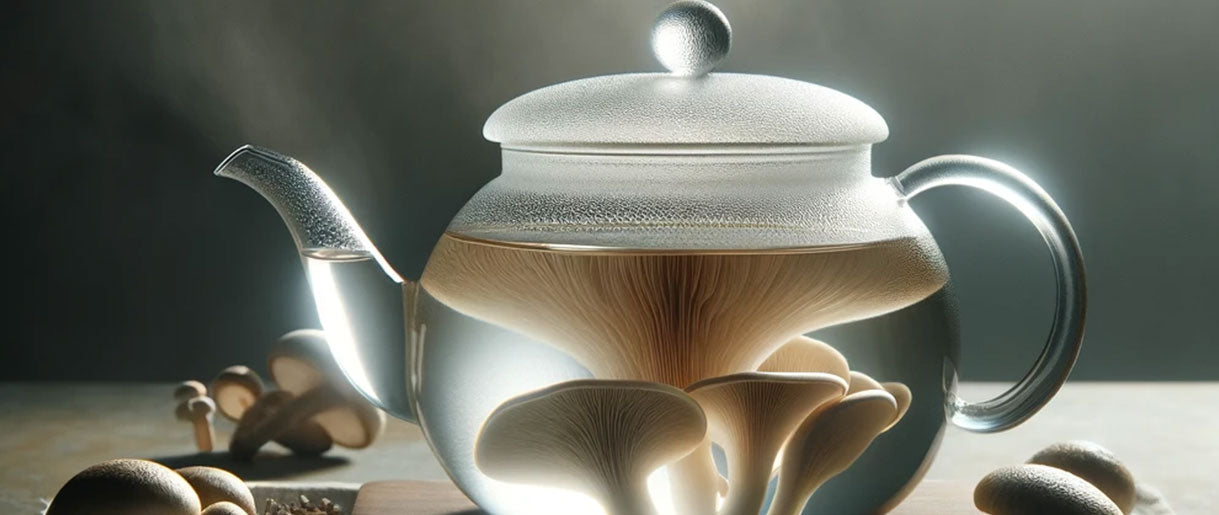
Hot water extraction is as straightforward as it sounds.
Here, the mushroom material is simmered in hot water to break down the cell walls and release water-soluble compounds like beta glucans.
This method is ideal for extracting complex carbohydrates and other compounds readily available in water.
Alcohol Extraction: Unveiling the Hidden
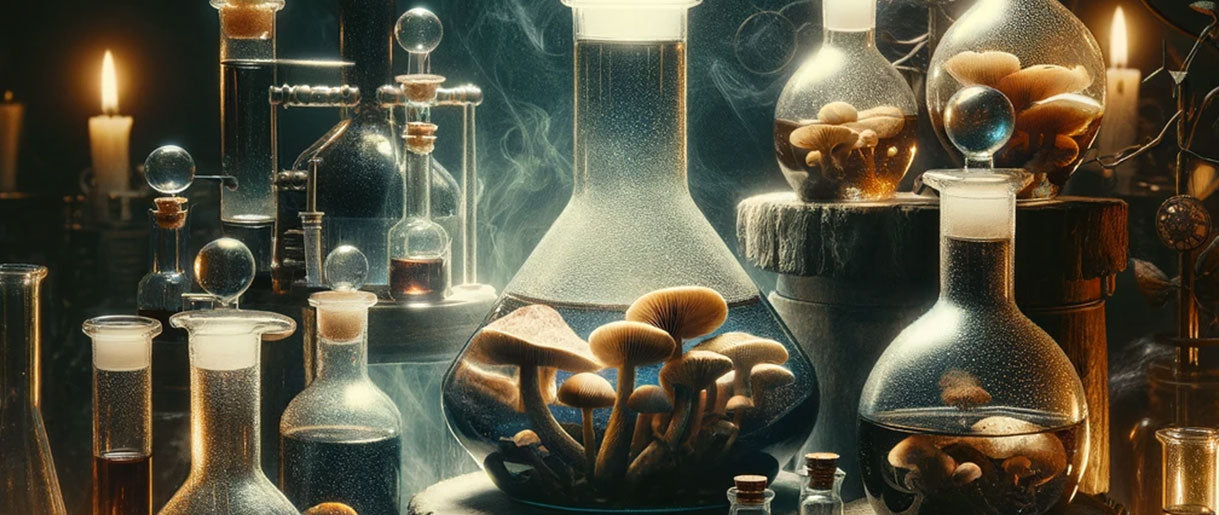
Some compounds in mushrooms, especially those that are alcohol soluble, need some extra nudge.
Alcohol extraction gently pulls out these elusive compounds, ensuring that your mushroom extract is comprehensive and complete.
Dual Extraction: The Best of Both Worlds (Combining Forces)
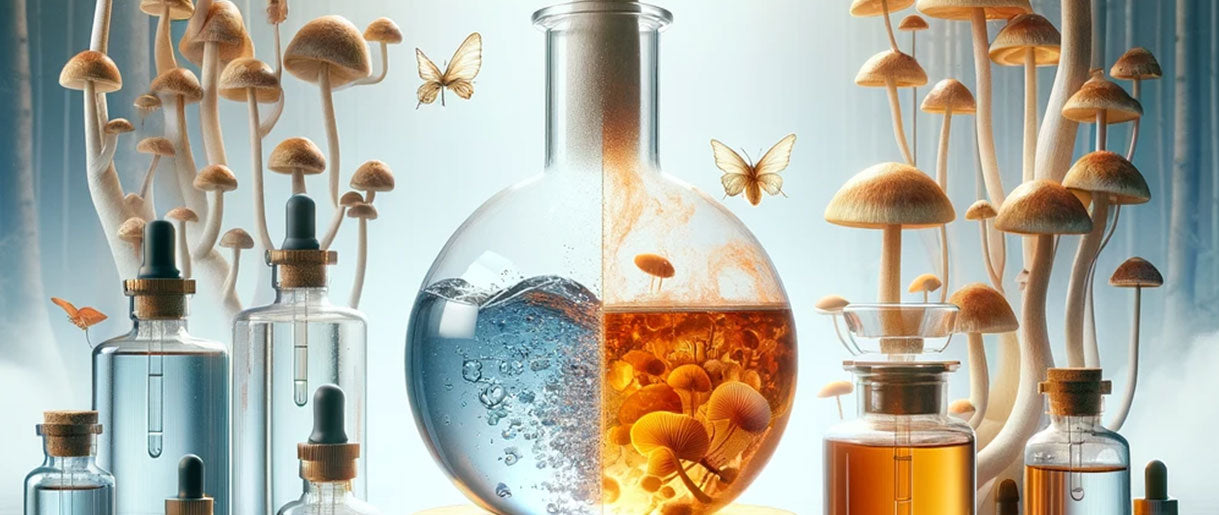
Dual extraction is where the magic really happens.
This method merges hot water and alcohol extraction techniques, ensuring that every possible beneficial element, be it water soluble or alcohol soluble, is captured.
This dual extraction process is particularly popular for creating high-quality mushroom supplements like Lion's Mane and Turkey Tail.
Incorporating Mushroom Extracts into Your Wellness Routine

So, how do you bring mushroom extracts into your everyday life? It's simpler than you might think.
Whether it's a spoonful of mushroom extract powder in your morning coffee—to make a cup of mushroom coffee—or a capsule of organic mushroom extracts, these little wonders are easy to integrate into your daily routine.
They offer a range of medicinal benefits, from boosting your immune system to enhancing cognitive function.
A Note on Quality and Consultation
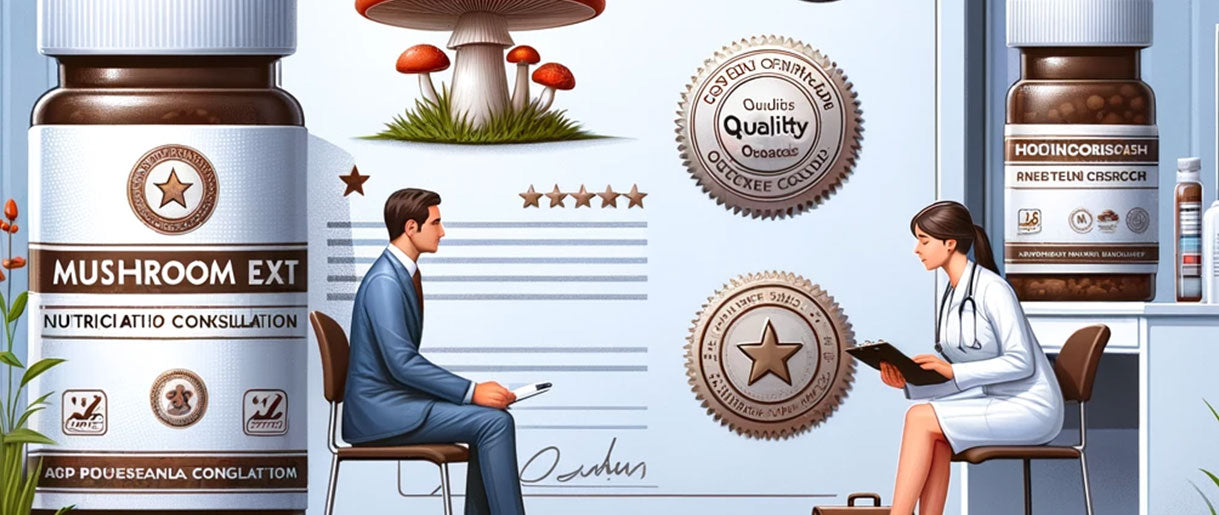
Remember, not all mushroom extracts are created equal. Opt for high-quality mushroom supplements that clearly state their extraction ratio and whether they use the fruiting bodies or other parts of the mushroom.
And, as always, it's wise to chat with a health practitioner before starting any new supplement, especially potent ones like mushroom extracts.
Mushroom Powders - Versatile and Convenient
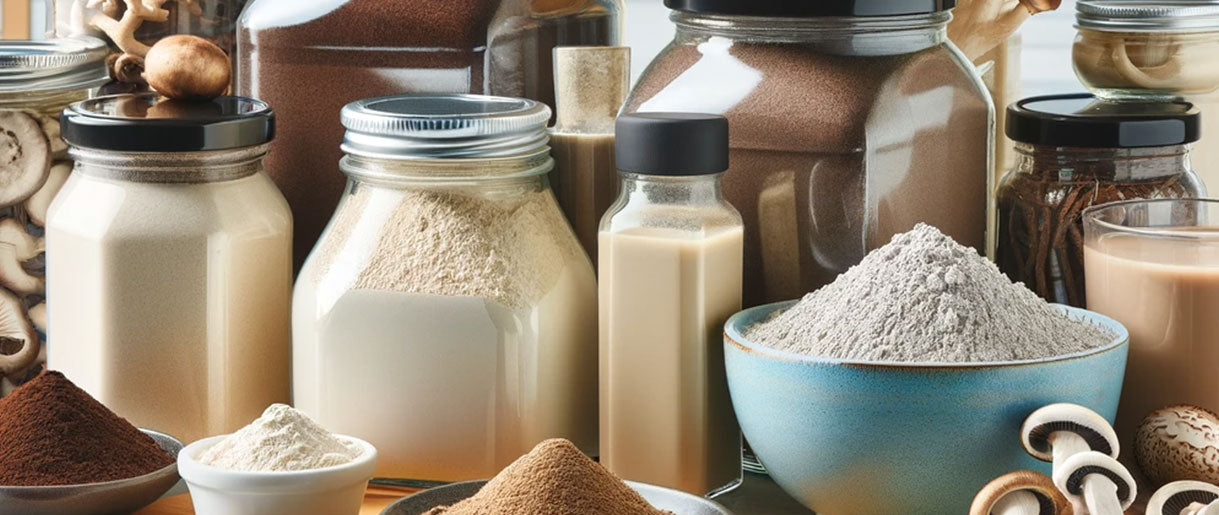
When we talk about mushroom powders, we're referring to a form of mushroom that is simple and ingenious.
Imagine taking whole mushrooms—the whole fruiting body—and drying them to the point where they can be ground into a fine powder.
This powder form of mushroom retains many of the beneficial compounds found in the original mushroom species but in a straightforward form to use and store.
The Making of Mushroom Powders
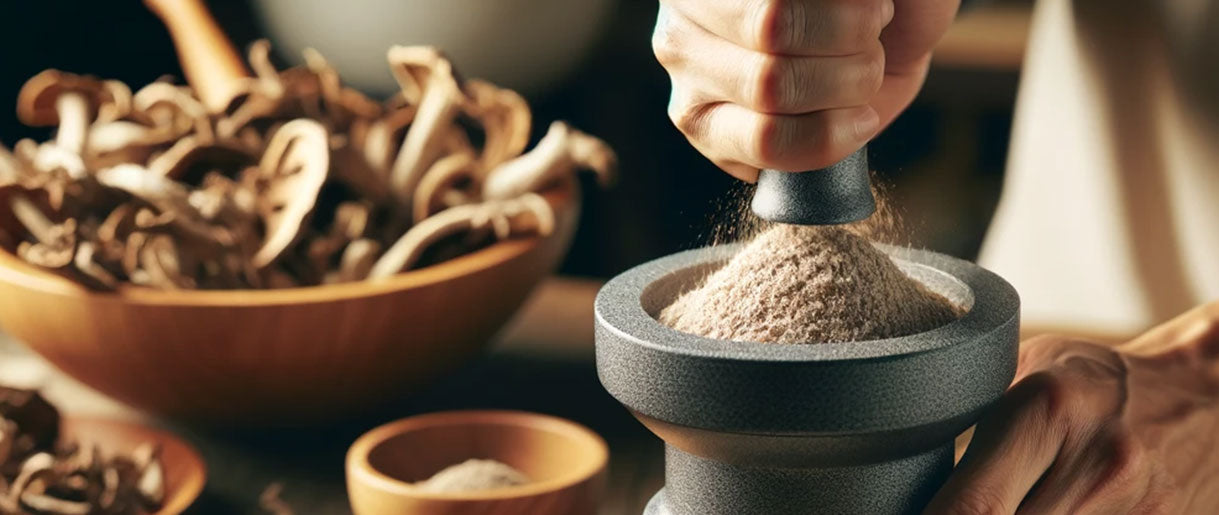
The journey from a fresh mushroom to mushroom powders is fascinating.
It begins with carefully selected, high-quality dried mushrooms. These are then meticulously ground into whole mushroom powders.
The beauty of this process is that it preserves the integrity of the mushroom compounds, ensuring that the powder form is as close to its natural state as possible.
Versatility at Its Best
One of the biggest charms of mushroom powders is their versatility. Whether sprinkling ground mushroom on your morning oatmeal, blending it with fruits to create a mushroom powder smoothie, or adding it to soups and stews, these powders are an easy way to incorporate the goodness of mushrooms into your diet.
Benefits and Uses: A Myriad of Possibilities
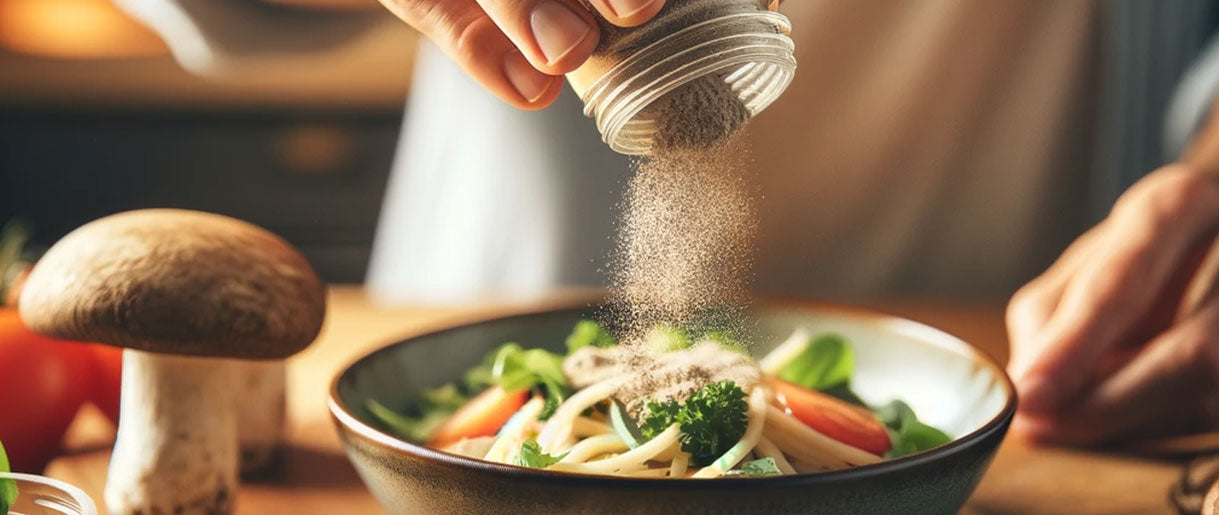
Mushroom powders are not just about convenience; they're about tapping into the wholesome benefits of mushrooms in every spoonful.
These powders, made from whole mushroom powders, bring a spectrum of nutrients and other polysaccharides to your table. And the best part? You're getting the benefits of the entire mushroom, not just a part of it.
A Mushroom Product for Every Need
Whether you choose a single mushroom species or a blend, each mushroom product offers its unique profile of benefits. From enhancing your immune system to supporting your overall well-being, mushroom powders are a simple, effective way to embrace the power of mushrooms in your daily life.
Extracts vs. Powders - A Comparative Analysis
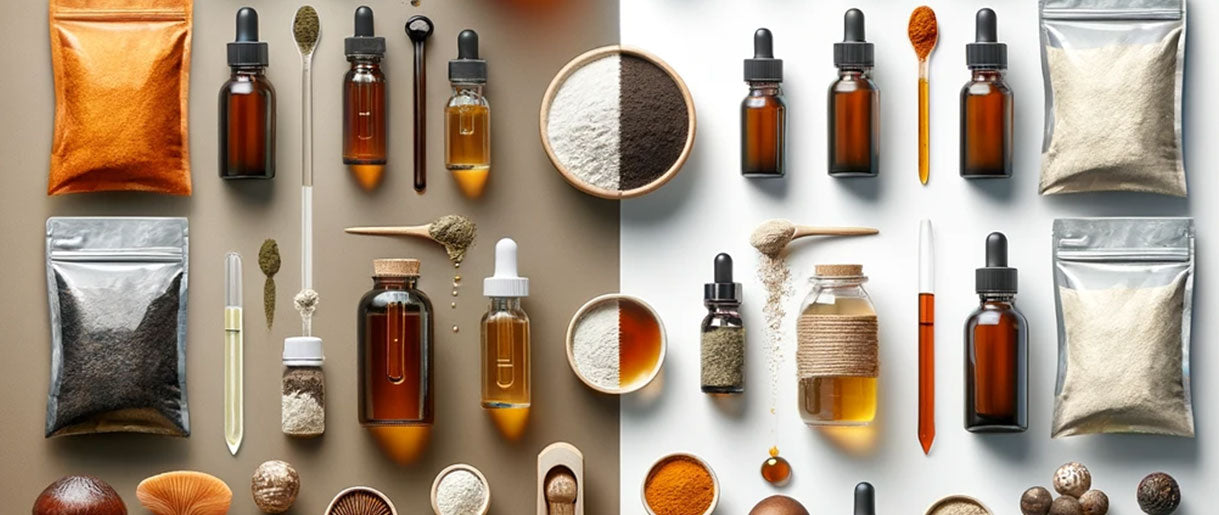
When it comes to the world of mushroom supplements, two stars often steal the show: medicinal mushroom extracts and whole mushroom powder.
Each has its unique strengths and applications, but how do they really stack up against each other? Let's dive into a comparative analysis focusing on potency, absorption, versatility, and shelf life.
Potency: Extracts Lead the Way
In the arena of potency, potent mushroom extract takes the crown.
Often produced using the dual extraction method, these extracts concentrate the alcohol-soluble compounds and other beneficial elements, producing a more potent product.
In contrast, whole mushroom powder maintains a more natural balance of compounds found in the raw material, which may be less concentrated but still valuable.
Absorption: The Bioavailability Factor
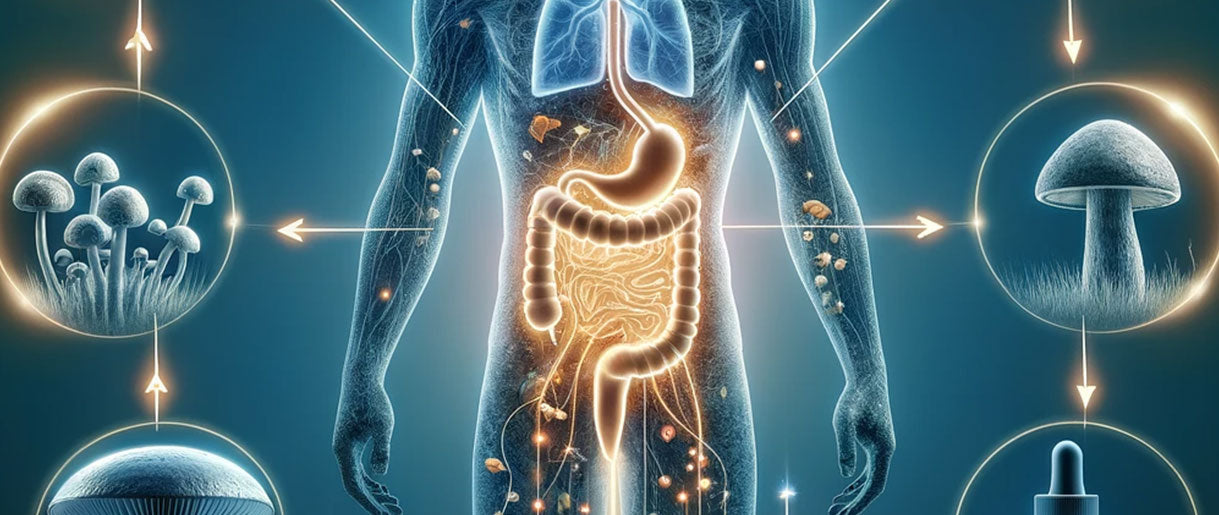
When it comes to absorption, extracts again have an edge due to their concentration and the breakdown of tough substances like chitin, a material in mushroom cell walls.
This makes the beneficial components more bioavailable. While still effective, whole mushroom powder may have less immediate absorption due to natural fibers and chitin.
Versatility: Powders Offer More Options
Mushroom powder vs. extract—when it comes to versatility, powders win.
Whole mushroom powder can be easily added to various dishes without altering flavor significantly, offering a broader range of culinary uses.
Due to their concentrated nature and sometimes bitter taste, extracts may be less versatile in cooking but are ideal for targeted supplementation.
Shelf Life: A Tie
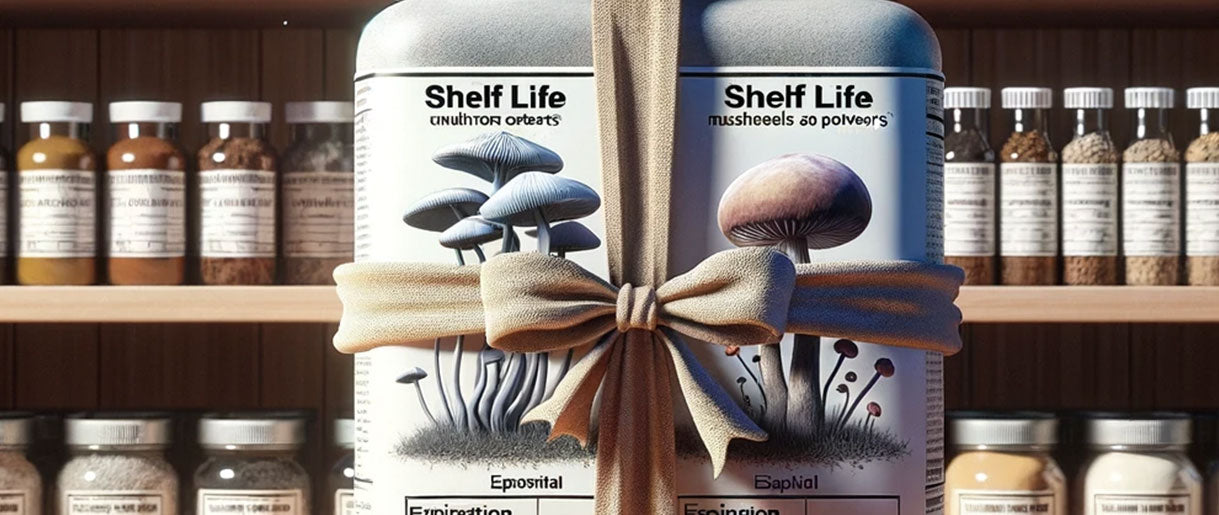
Both forms boast a long shelf life when stored properly. Mushroom supplements, whether in powder or extract form, are stable and can be kept for extended periods, making them a convenient option for long-term use.
Personalizing Your Mushroom Journey
Embarking on your mushroom journey is like choosing the perfect adventure in a storybook. It's all about finding what resonates with your unique health goals and lifestyle.
Whether you lean towards powder and mushroom extract or are curious about extract powders, here's a little guidance to help you pick your path.
Understanding Your Health Goals

First, ask yourself, what are you looking to achieve? If it's specific health targets like boosting cognitive function or supporting your immune system, mushroom extract powders might be your hero. These potent extracts are designed for targeted benefits, delivering concentrated nutrients in every scoop.
On the other hand, if your goal is to generally uplift your health, add a nutritional boost to your diet, or seek a gentle introduction to the world of mushrooms, then powder and mushroom extract options are ideal. These powders are easy to incorporate into your daily meals, offering a balanced profile of mushroom goodness.
Lifestyle Considerations

Next, think about your lifestyle. Are you always on the go, looking for quick, easy solutions? Extract powders, with their straightforward, no-fuss approach, could be the perfect match.
But, if you enjoy experimenting in the kitchen and don't mind adding a pinch of this and a dash of that, whole mushroom powders offer versatility and can be a fun addition to your culinary creations.
And if you are learning how to use mushroom powders, the learning curve is smaller, meaning you can enjoy culinary delights quickly.
Interactive Element: Find Your Mushroom Match
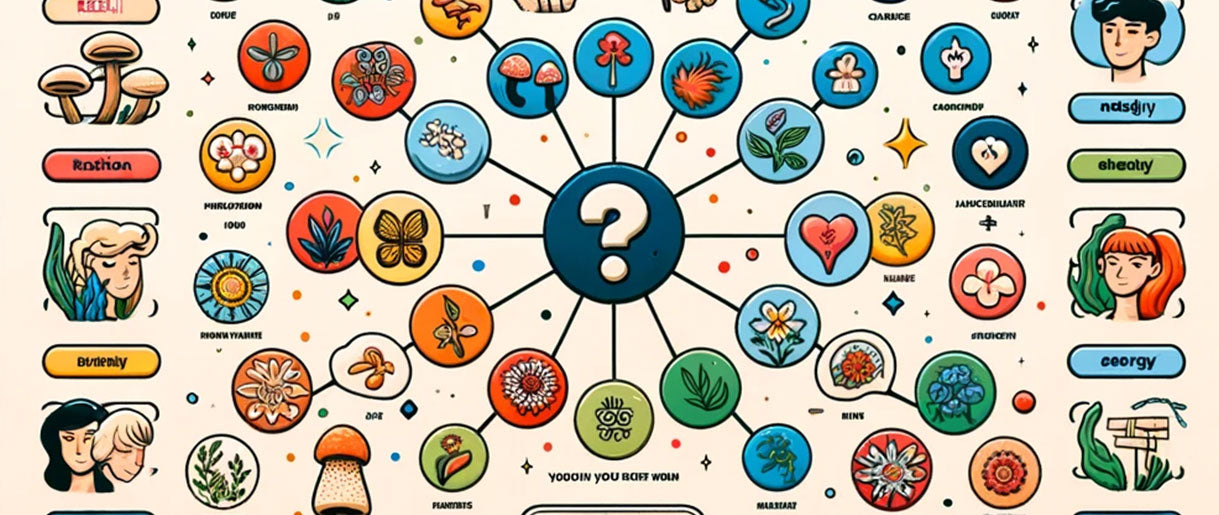
To make things even more exciting, let's play a quick game to find your mushroom match! Answer these questions and tally your points to see which mushroom supplement suits you best:
What's Your Primary Health Goal?
- Targeted health benefits (e.g., brain health, immune support) (2 points)
- Overall wellness and nutritional boost (1 point)
How Do You Prefer To Take Supplements?
- In concentrated, potent form (2 points)
- Easily mixed into food and drinks (1 point)
What's Your Approach To Cooking?
- I prefer quick, no-fuss meals (2 points)
- I love experimenting with flavors and ingredients (1 point)
Scoring:
- 4-6 Points: You're a match for mushroom extract powders! Their potency and ease of use align perfectly with your health goals and lifestyle.
- 1-3 Points: Whole mushroom powders are your go-to! Their versatility and gentle nutrition are just what you need.
Remember, whether it's mushroom extract powders or powder and mushroom extract, each step you take on this mushroom journey is a step towards a healthier, more vibrant you.
Integrating Mushrooms into Your Wellness Regimen
Embarking on a wellness journey with mushrooms is like discovering a hidden garden of health treasures. It's about weaving these natural wonders into your daily life seamlessly and enjoyably. Here are some practical tips and recipes to help you integrate mushroom products into your routine, emphasizing a holistic approach to wellness.
Start Your Day with a Mushroom Boost
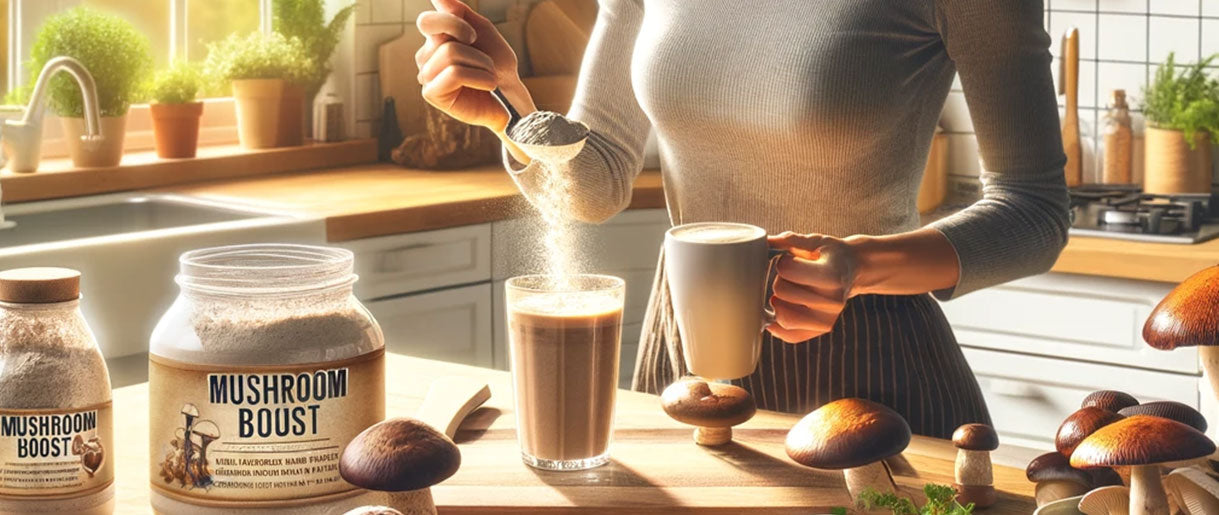
Morning Smoothie
Blend your favorite fruits with a scoop of mushroom powder. Add a banana or some Greek yogurt for creaminess, and you've got a nutrient-packed breakfast.
Mushroom Coffee
In the battle of mushroom coffee vs. regular coffee, mushroom coffee wins—try it today to see the results for yourself. Just stir a teaspoon of mushroom extract powder into your morning coffee. It's a simple way to kickstart your day with an extra health boost.
Savory Snacks and Meals

Mushroom Broth
Simmer veggies with whole mushroom powder for a savory, nourishing broth. Perfect as a base for soups or as a warm, comforting drink.
Mushroom Seasoning
Mix mushroom powder with herbs and use it as a seasoning for your dishes. It's great on roasted vegetables, grilled meats, or even sprinkled over popcorn.
Sweet Treats

Mushroom-Infused Baking
Add mushroom powder to your baking recipes. It can go into bread, muffins, or pancakes, adding a nutritious twist to your favorite treats. You can also try our Lion's Mane mushroom recipes if you need some ideas to get you started.
Chocolate Mushroom Delight
Mix mushroom extract powder into homemade hot chocolate or blend it with a chocolate protein shake for a delicious, healthful dessert.
Holistic Wellness Practices
Meditation and Mindfulness
Pair your mushroom regimen with mindfulness practices. Sipping a cup of mushroom-infused tea while meditating can enhance your focus and calm.
Regular Exercise
Combine the energy-boosting properties of mushrooms with regular physical activity. Whether it's yoga, jogging, or a gym session, mushrooms can help support your energy levels and recovery.
Evening Wind-Down

Relaxing Mushroom Tea
Brew a cup of Reishi mushroom tea in the evening. Herbs like chamomile or lavender can be added to enhance relaxation and prepare you for a restful night.
Remember, integrating mushrooms into your wellness regimen is about balance and finding what works best for you. Whether through food, drinks, or mindful practices, mushrooms can be a harmonious addition to your journey toward holistic health.
FAQs About Mushroom Extract vs. Powder
Why Don't I Feel a Difference After Taking Mushroom Supplements?
Mushroom supplements work subtly, and their effects are not immediate. The beneficial compounds, particularly beta-glucans, take time to impact the body.
If you're not noticing any changes, it could be because you haven't taken them long enough to see the effects. Patience is key with these natural supplements.
Are there any side effects of mushroom supplements?
While most mushroom supplements are considered safe for general consumption, they are not without potential side effects. Some people may experience digestive upset, dry mouth, and skin irritation.
Therefore, it's always a good idea to consult a healthcare provider before starting any new supplement regimen, especially if you have existing health conditions or are taking other medications.
How Long Does It Take to Feel Effects from Mushroom Supplements?
The time it takes to feel the benefits of mushroom supplements can vary greatly depending on individual factors, the specific supplement, and the dosage.
Some people might notice effects within a few days to weeks, but consistent use over several months might be necessary for more substantial therapeutic benefits.
Key Takeaways
As we close the chapter on our mushroom exploration, remember, whether you choose the potent precision of extracts or the natural wholesomeness of powders, you're not just adding a supplement to your diet but embracing a piece of ancient wisdom and modern science.
Mushrooms are more than just a wellness trend; they're a journey into holistic health and self-discovery. So, experiment, find your perfect mushroom match, and let these natural wonders guide you to a healthier, more vibrant life.
And hey, we're curious about your mushroom adventures! Have you tried mushroom supplements before? What was your experience like? Are you team extract or team powder? Drop a comment below and share your story.
Your insights could be the guiding light for someone else's wellness journey. Here's to exploring the magical world of mushrooms together!🍄✨
References
- Immune Modulation From Five Major Mushrooms: Application to Integrative Oncology, (1), https://www.ncbi.nlm.nih.gov/pmc/articles/PMC4684115/
- Medicinal Mushrooms: Bioactive Compounds, Use, and Clinical Trials, (2), https://www.ncbi.nlm.nih.gov/pmc/articles/PMC7826851/
- Immuno-physiological effects of dietary reishi mushroom powder as a source of beta-glucan on Rohu, Labeo rohita challenged with Aeromonas veronii, (3), https://www.nature.com/articles/s41598-023-41557-9




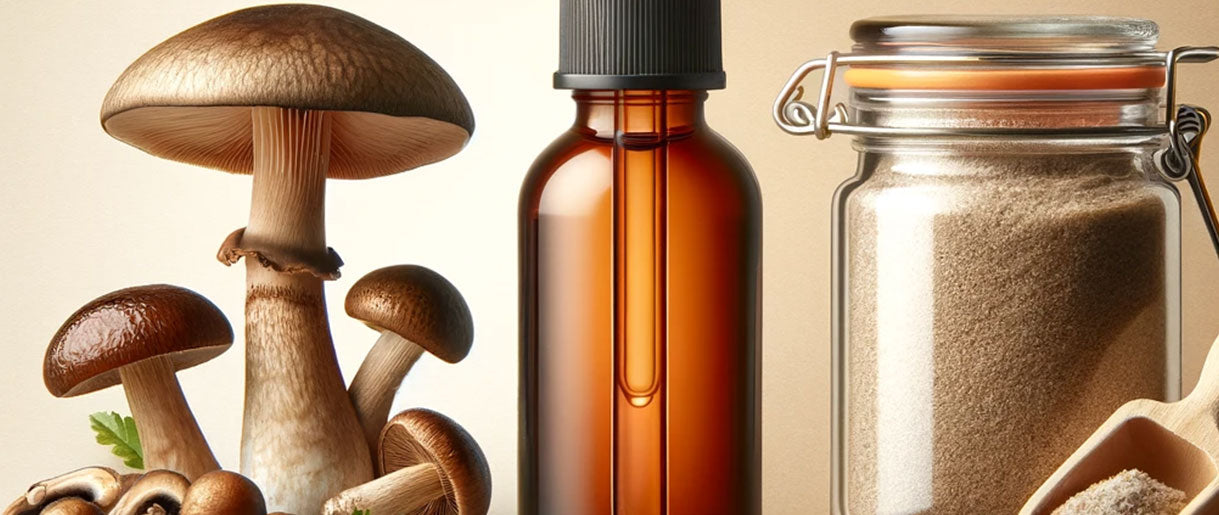

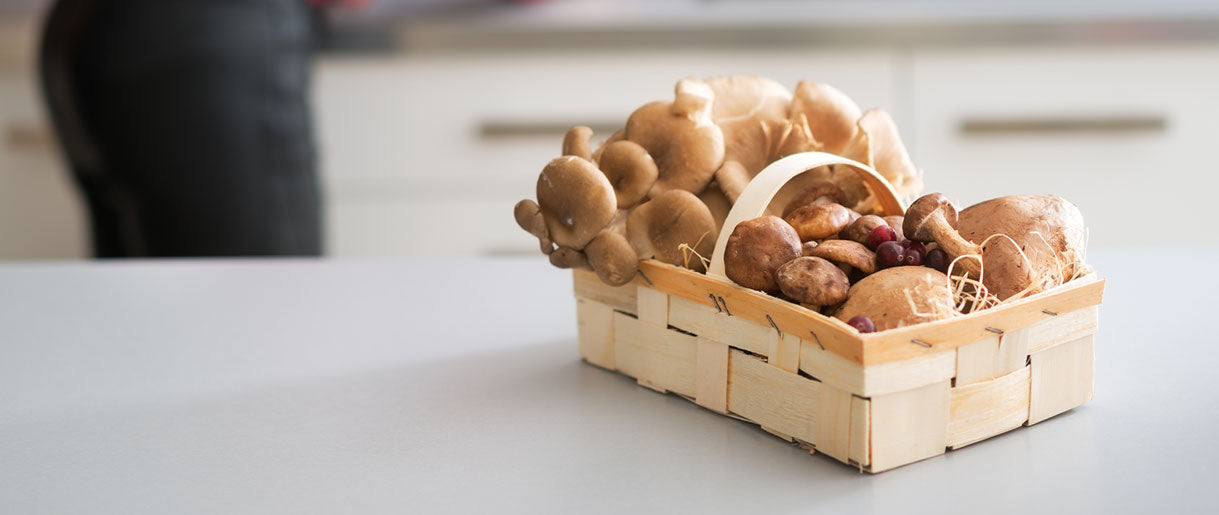
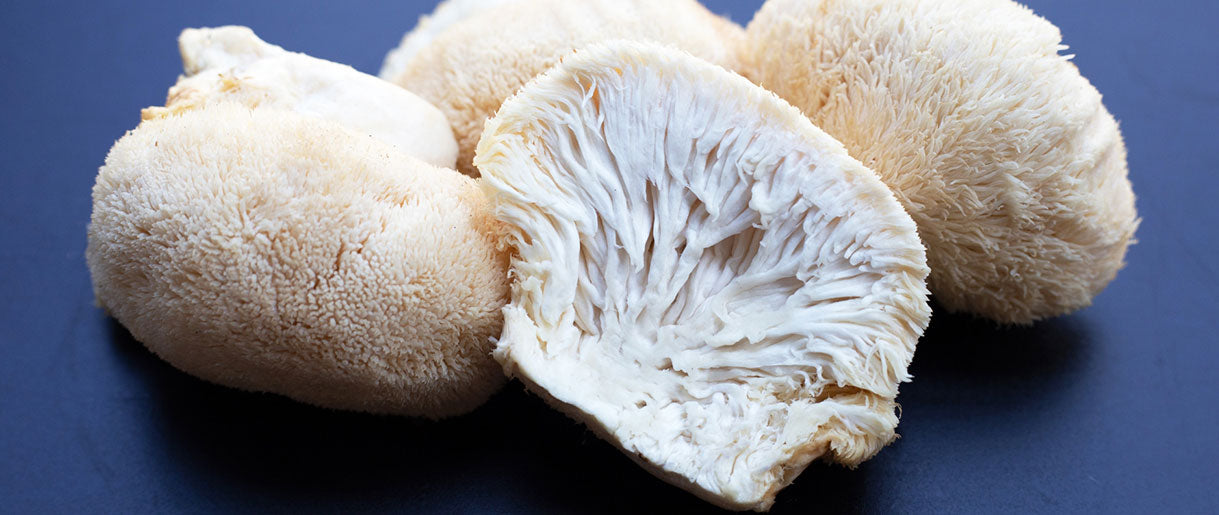
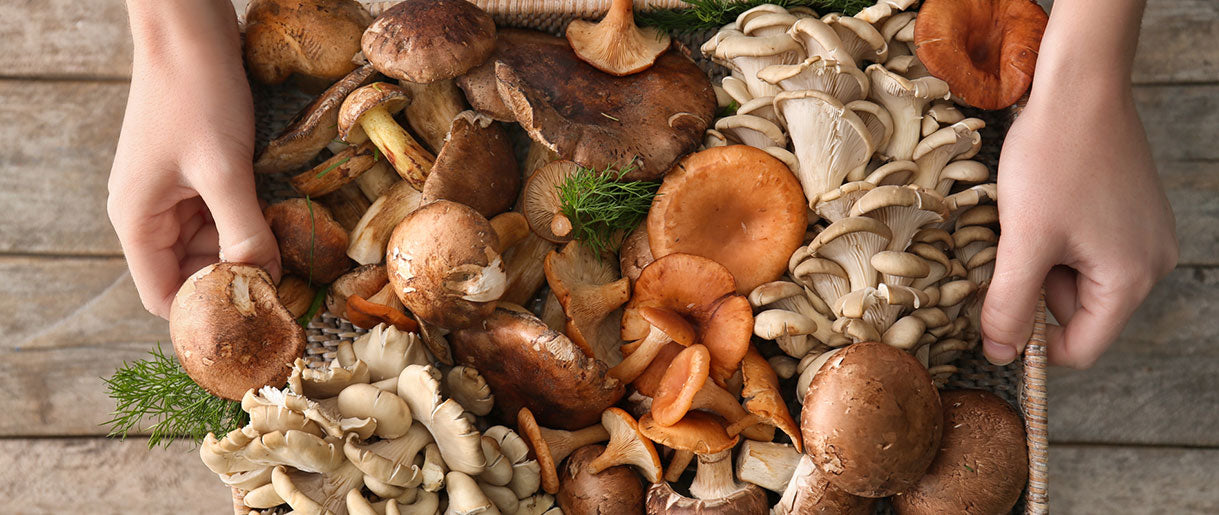
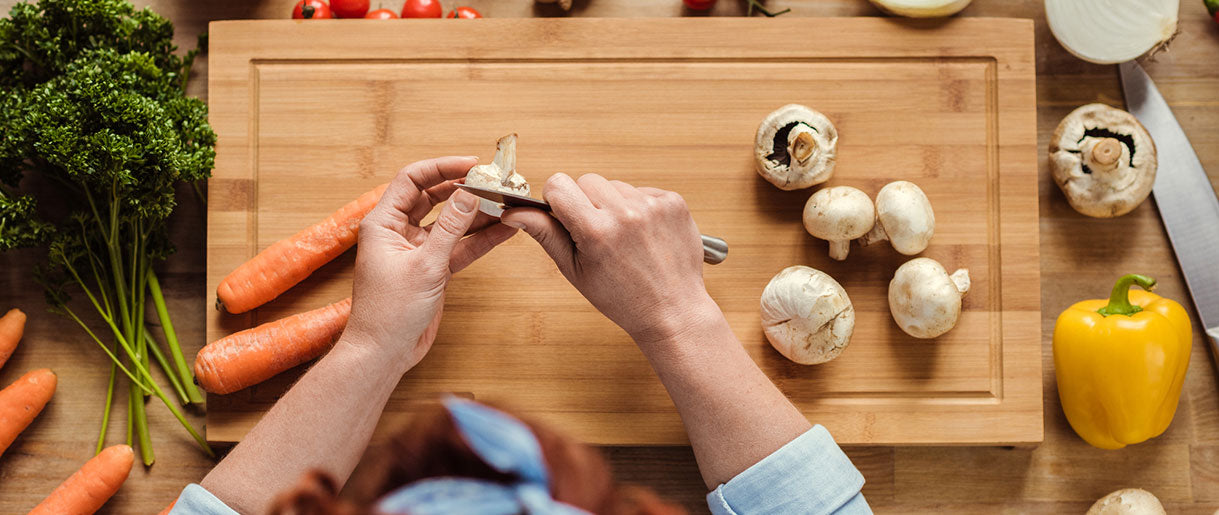
Let Us Know Your Comments